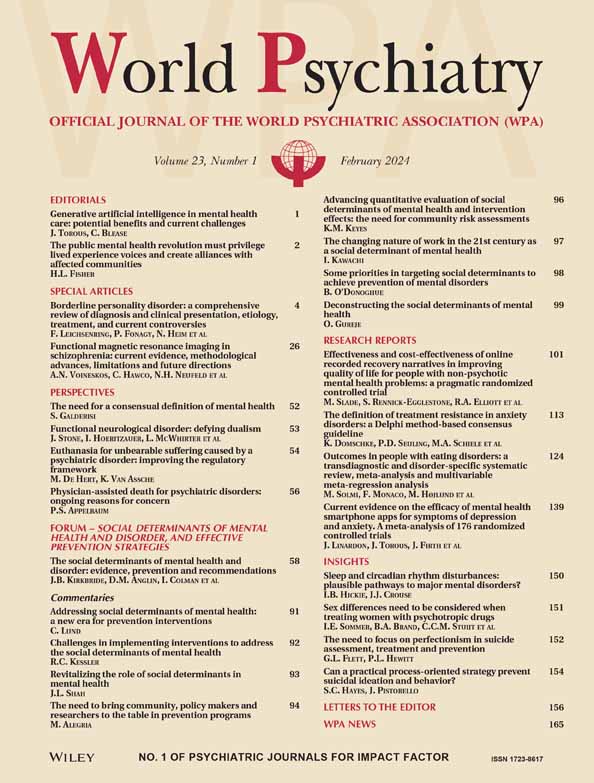DSM‐5‐TR:新事物和变化的概述
IF 65.8
1区 医学
Q1 PSYCHIATRY
引用次数: 9
摘要
了解以上讨论的因素有助于理解对许多科学家和卫生专业人员来说,疫苗接种辩论中最令人恼火和最难理解的特征之一:事实不够。对于那些自我认同为反疫苗者的人来说,仅仅重复证据是一种臭名昭著的无效转变态度的方式。其中一个原因是,人们的行为并不总是像认知科学家那样,在得出结论之前权衡证据。通常情况下,我们的行为更像认知律师,有选择地暴露自己,批评和记住证据,以加强对我们来说“正确”的结论。成功的沟通需要深入倾听和关注可能导致拒绝COVID-19的恐惧、世界观和意识形态。对这些潜在的“态度根源”做出回应的说服尝试比那些只关注事实和数据的说服尝试更有可能成功。最后,精神卫生专业人员和任何人一样,都认识到非污名化和包容性沟通的重要性。尽管反对疫苗接种运动的公众形象有时显得刺耳,不值得同情,但与这些观点保持一致的社区成员往往表现出焦虑和不确定性。有可能出现负反馈循环,在这种情况下,对疫苗犹豫不决的人感到被误解和污名化,从而强化了他们的世界观,即该系统是腐败的,缺乏人性。感到社会孤立,拒绝接种疫苗的人可能会被驱赶到网络社区和错误信息的回音室,这加剧了他们的恐惧。尊重和包容的沟通不仅仅是一件“好”的事情;在务实的层面上,这是实现积极变革的先决条件。本文章由计算机程序翻译,如有差异,请以英文原文为准。
DSM‐5‐TR: overview of what’s new and what’s changed
World Psychiatry 21:2 June 2022 Understanding the factors discussed above helps make sense of what, for many scientists and health professionals, is one of the most exasperating and difficult-to-understand features of the vaccination debate: facts are not enough. Merely repeating evidence has been a notoriously ineffective way of shifting attitudes among those who self-identify as anti-vaccination. One reason for this is that people do not always behave like cognitive scientists, weighing up evidence before reaching a conclusion. Frequently, we behave more like cognitive lawyers, selectively exposing ourselves, critiquing, and remembering evidence that reinforces a conclusion that feels “right” for us. Successful communication requires deep listening and an attentiveness to the fears, worldviews and ideologies that might be motivating COVID-19 refusal. Persuasion attempts that are responsive to these underlying “attitude roots” are more likely to be successful than those that sail above them with an exclusive focus on facts and data. Finally, mental health professionals recognize as much as anyone the importance of communication that is non-stigmatizing and inclusive. Although the public face of the anti-vaccination movement sometimes seems strident and unworthy of empathy, community members who align with those views are frequently characterized by anxiety and uncertainty. There is the potential for negative feedback loops, where the vaccine hesitant feel misunderstood and stigmatized, reinforcing their worldview that the system is corrupted and lacking in humanity. Feeling socially isolated, vaccine refusers may be driven toward the online communities and misinformation echo chambers that reinforce their fears. Respectful and inclusive communication is not just the “nice” thing to do; on a pragmatic level, it is a pre-requisite for enabling positive change.
求助全文
通过发布文献求助,成功后即可免费获取论文全文。
去求助
来源期刊

World Psychiatry
医学-精神病学
自引率
7.40%
发文量
124
期刊介绍:
World Psychiatry is the official journal of the World Psychiatric Association. It is published in three issues per year.
The journal is sent free of charge to psychiatrists whose names and addresses are provided by WPA member societies and sections.
World Psychiatry is also freely accessible on Wiley Online Library and PubMed Central.
The main aim of World Psychiatry is to disseminate information on significant clinical, service, and research developments in the mental health field.
The journal aims to use a language that can be understood by the majority of mental health professionals worldwide.
 求助内容:
求助内容: 应助结果提醒方式:
应助结果提醒方式:


